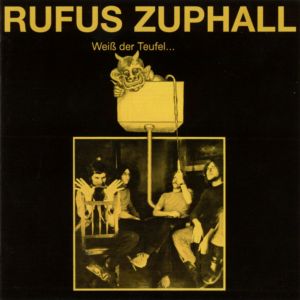
- Format: MP3

Rufus Zuphall is one of the significant German rock bands of the early seventies. This first CD, part of a series of three CDs, describes their musical development - beyond the first LP thro' to the farewell concert in '72. With this - the "complete work" of Rufus Zuphall is available for the first time on CD.
Formed in Aachen in 1969 and initially with a keyboard player as fifth man, the band melted together blues elements, the ease of Anglo-Saxon folk, classical influences and driving guitar rock with progressive song structures into an autonomous instrumental dominated style and live programme. The titles "Hollis Brown" and "Granum Cerebri" from forthcoming third CD "Avalon And On" are from this period.
In the beginning the band was not so Germany-orientated but more towards the neighbouring countries Belgium and particularly Holland and their breakthrough came accordingly in 1970 in front of a 30.000 crowd at the Jazz Festival in Bilzen (Belgium). Actually planned as a sideshow, they then played as the only amateur band next to such stars as Black Sabbath, Cat Stevens or May Blitz and were celebrated by the press as "surprise of the festival". Previously Rufus Zuphall had even appeared with Living Blues and Cuby and the Blizzards, in the same year this was followed by gigs with Curtis Jones, Group 1850 and Golden Earring.
The front man on stage was the flutist Klaus Gülden. He had a decisive influence on the Rufus Zuphall sound. Bass player Helmut Lieblang wrote the lyrics. Günter Krause, a creative guitar talent, composed most of the titles and with Udo Dahmen Rufus Zuphall had a drummer, who later, after his music studies, then played with Kraan, Lake, Eberhardt Schöner and Achim Reichel and is even today much asked after. He is also studio drummer and worked as a lecturer at the Hamburg College of Music. Today he is headmaster of Mannheim College of Popular Music. Apart from Udo Dahmen, the only other one of the various Rufus Zuphall members who remained true to a musical career was Günter Krause. After Rufus Zuphall had come to a close, he too studied music, he then played jazz and jazz rock in various formations - he played into the 80s as a jazz guitarist in a sextet making records. Today he's working as a musician, composer and guitar teacher.
At the beginning of December 1970, Rufus Zuphall produced live in Holland their first LP "Weiß der Teufel" in only three days. It was released in 1971 as a private pressing on Good Will Records - a masterpiece of progressive rock. The titlesong was a secret "scene hit" and the track "Spanferkel" taken from the LP became the signature tune for one of the best known German radio rock programmes. The LP, although the release was limited and despite bad marketing conditions, was a success.
In spring 1971 Rufus Zuphall recorded their second LP "Phallobst" and third album "Avalon And On" was planned to release in late 1972. But it was never finished. The band disbanded in September 1972.
In 1999 their was a reunion followed by a lot of gigs and the release of the CD "Colder Than Hell" in 2000. Between June and September 1972 their was a short series of 6 farewell concerts. The last was at the beginning of September in Eindhoven (Holland). The first was a concert for their fans in Aachen on June 17th 1972, in the eyes of the band one of the true musical highlights of Rufus Zuphall. Here is dynamism, creativity and enthusiasm to be heard, one can feel the stage experience and intimacy of a group that despite all other activities in 1971 alone managed to make over 50 appearances.
Bonustracks:
"Farewell Live Aachen '72", as bonus tracks split on this and the following "Phallobst"-CD, shows the musical range of Rufus Zuphall, the full bounds of Rhythm'n Blues - inspired beginnings with songs like "Wade In The Water" or "See See Rider" thro' to rockers like "Prickel Pit" or progressive titles like "Avalon Suite", it shows classical influences, free song structures with jazz elements and includes with "Summertime" or "Spanferkel" fundamental group hits.